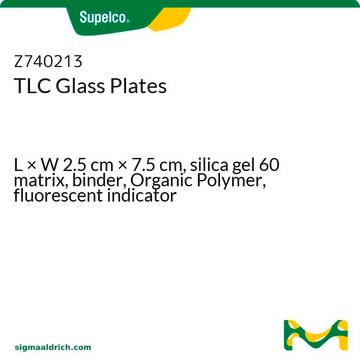1.15326
TLC plates, Silica gel 60
pkg of 100 plates, plate L × W 2.5 cm × 7.5 cm, glass support
Synonym(s):
Silica Gel 60 TLC Plates
Sign Into View Organizational & Contract Pricing
All Photos(1)
About This Item
UNSPSC Code:
41115711
NACRES:
NB.21
layer thickness:
250 μm
plate L × W:
2.5 cm × 7.5 cm
feature:
binder Organic Polymer
fluorescent indicator: no
fluorescent indicator: no
pore size:
60 Å medium pore diameter
Recommended Products
material
glass support
silica gel 60 matrix
Quality Level
feature
binder Organic Polymer
fluorescent indicator: no
packaging
pkg of 100 plates
technique(s)
thin layer chromatography (TLC): suitable
layer thickness
250 μm
plate L × W
2.5 cm × 7.5 cm
particle size
10-12 μm
pore size
60 Å medium pore diameter
storage temp.
2-30°C
General description
100 Glass plates 2.5 x 7.5 cm
Our classical silica TLC plates are based on a combination of our proven silica gel 60 and the addition of a unique polymeric binder resulting in a very adherent and hard surface that will not crack or blister and even allow writing with a pensil on the surface without risk to damage the layer.
Application
- Protein-Polymer Conjugates Synthesized Using Water-Soluble Azlactone-Functionalized Polymers: Highlighting the versatility of triethylene glycol monomethyl ether in polymer synthesis, this research develops conjugates for receptor-specific cellular uptake, crucial for targeted drug delivery systems (Kim et al., 2019).
- Hydrogen-bonded six-component assembly for capsule formation: Utilizing triethylene glycol monomethyl ether, this study creates complex capsule structures with applications in material science, particularly for photoresponsive systems (Togari et al., 2018).
- An ultra-small thermosensitive nanocomposite with a Mo(154)-core: This research incorporates triethylene glycol monomethyl ether in the development of a comprehensive platform for NIR-triggered photothermal-chemotherapy, marking a significant advancement in cancer treatment technologies (Zhang et al., 2018).
- Synthesis of Polyester Dendritic Scaffolds for Biomedical Applications: Featuring triethylene glycol monomethyl ether, this article explores its use in the synthesis of polyester dendritic scaffolds, enhancing biomedical applications such as tissue engineering and regenerative medicine (Sadowski et al., 2016).
Linkage
Replaces: 15326-1; 15326
Analysis Note
Specific surface area (according to BET; 5-Pt. measurement): 480 - 540 m²/g
Pore volume (N₂-isotherm): 0.74 - 0.84 ml/g
d 50 (laser diffraction, size distribution): 9.7 - 11.7 µm
Layer thickness: 210 - 270 µm
Deviation of layer thickness per plate: ≤ 35 µm
Chromatographic testing:
colour test
hRf-values
- bleu vif organol, colour test, lipophile:
11 - 25
- Ceres Black G, colour test, lipophile: 34 - 48
- ceres Violet brn, colour test, lipophile: 52 - 67
separation number (colourtest, lipophile): ≥ 9.0
Typical value determined on a conditioned plate
Eluent: toluene (45% rel. humidity)
Pore volume (N₂-isotherm): 0.74 - 0.84 ml/g
d 50 (laser diffraction, size distribution): 9.7 - 11.7 µm
Layer thickness: 210 - 270 µm
Deviation of layer thickness per plate: ≤ 35 µm
Chromatographic testing:
colour test
hRf-values
- bleu vif organol, colour test, lipophile:
11 - 25
- Ceres Black G, colour test, lipophile: 34 - 48
- ceres Violet brn, colour test, lipophile: 52 - 67
separation number (colourtest, lipophile): ≥ 9.0
Typical value determined on a conditioned plate
Eluent: toluene (45% rel. humidity)
Certificates of Analysis (COA)
Search for Certificates of Analysis (COA) by entering the products Lot/Batch Number. Lot and Batch Numbers can be found on a product’s label following the words ‘Lot’ or ‘Batch’.
Already Own This Product?
Find documentation for the products that you have recently purchased in the Document Library.
Customers Also Viewed
Our team of scientists has experience in all areas of research including Life Science, Material Science, Chemical Synthesis, Chromatography, Analytical and many others.
Contact Technical Service






